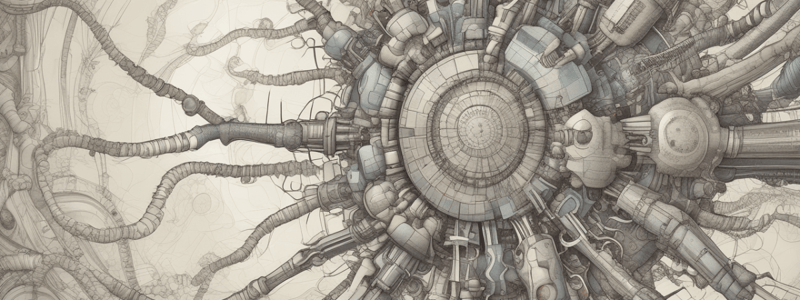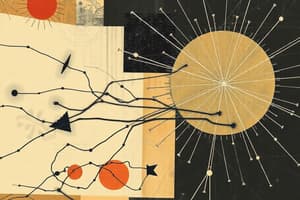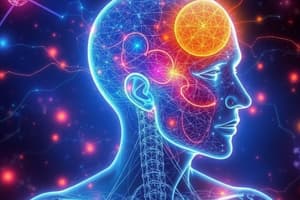Podcast
Questions and Answers
Which type of mechanoreceptors respond throughout the duration of the stimulus?
Which type of mechanoreceptors respond throughout the duration of the stimulus?
- Pacinian corpuscles
- Merkel’s disks (correct)
- Ruffini’s corpuscles (correct)
- Meissner’s corpuscles
What type of nociceptors are responsible for fast pain?
What type of nociceptors are responsible for fast pain?
- A-delta fibers (correct)
- A-delta mechanosensitive nociceptors
- C fibers
- Polymodal nociceptors
What is the function of thermoreceptors?
What is the function of thermoreceptors?
- To detect changes in vibration
- To detect changes in pressure
- To detect changes in temperature (correct)
- To detect changes in touch
Which of the following receptors is responsible for signaling continuous touch of objects against the skin?
Which of the following receptors is responsible for signaling continuous touch of objects against the skin?
What type of fibers are associated with free nerve endings?
What type of fibers are associated with free nerve endings?
Which type of mechanoreceptors responds at the onset/offset of the stimulus?
Which type of mechanoreceptors responds at the onset/offset of the stimulus?
What is the function of A-delta mechanosensitive nociceptors?
What is the function of A-delta mechanosensitive nociceptors?
Where are Ruffini’s corpuscles located?
Where are Ruffini’s corpuscles located?
Which pathway carries sensory information from the face, head, mouth, and nasal cavity?
Which pathway carries sensory information from the face, head, mouth, and nasal cavity?
Where do the first-order axons in the Dorsal Column Pathway synapse with second-order neurons?
Where do the first-order axons in the Dorsal Column Pathway synapse with second-order neurons?
What is the function of the Spinoreticular tract?
What is the function of the Spinoreticular tract?
What is the name of the bundle of axons that decussate the midline of medulla and ascend the brainstem?
What is the name of the bundle of axons that decussate the midline of medulla and ascend the brainstem?
What is the function of the Fibers in the dorsal columns?
What is the function of the Fibers in the dorsal columns?
Where do the second-order neurons in the Dorsal Column Pathway terminate?
Where do the second-order neurons in the Dorsal Column Pathway terminate?
What is the function of the Spinohypothalmic and spinotelencephalic tracts?
What is the function of the Spinohypothalmic and spinotelencephalic tracts?
What is the name of the two tracts that mediate sensation and proprioception?
What is the name of the two tracts that mediate sensation and proprioception?
What type of stimuli is received by Lamina I of Rexed's laminae?
What type of stimuli is received by Lamina I of Rexed's laminae?
What is the main site of action for opioids in the spinal cord?
What is the main site of action for opioids in the spinal cord?
What is the arrangement of fibers in the spinothalamic tract?
What is the arrangement of fibers in the spinothalamic tract?
Which type of pain is transmitted through the neospinothalamic tract?
Which type of pain is transmitted through the neospinothalamic tract?
What is the function of the Tract of Lissauer?
What is the function of the Tract of Lissauer?
What type of fibers terminate in Lamina V of Rexed's laminae?
What type of fibers terminate in Lamina V of Rexed's laminae?
What is the function of the dorsal column pathway?
What is the function of the dorsal column pathway?
What is the significance of the convergence of noxious and non-noxious stimuli in Lamina V?
What is the significance of the convergence of noxious and non-noxious stimuli in Lamina V?
Where are the cell bodies of third-order neurons located?
Where are the cell bodies of third-order neurons located?
What is the function of the periaqueductal gray matter?
What is the function of the periaqueductal gray matter?
What neurotransmitter is released by the nucleus raphe magnus?
What neurotransmitter is released by the nucleus raphe magnus?
What is the effect of enkephalin on nociception?
What is the effect of enkephalin on nociception?
Where do the axons of third-order neurons terminate?
Where do the axons of third-order neurons terminate?
What is the function of the nucleus raphe magnus?
What is the function of the nucleus raphe magnus?
What is the effect of serotonin on nociception?
What is the effect of serotonin on nociception?
Where do the descending pain pathway fibers synapse?
Where do the descending pain pathway fibers synapse?
What is a major limitation of the Intensity Theory of Pain?
What is a major limitation of the Intensity Theory of Pain?
Who first conceptualized the Intensity Theory of Pain?
Who first conceptualized the Intensity Theory of Pain?
According to the Pattern Theory of Pain, how are sensory impulses coded?
According to the Pattern Theory of Pain, how are sensory impulses coded?
What is a key proposition of the Gate Control Theory of Pain?
What is a key proposition of the Gate Control Theory of Pain?
What is a major difference between the Specificity Theory of Pain and the Intensity Theory of Pain?
What is a major difference between the Specificity Theory of Pain and the Intensity Theory of Pain?
What is a limitation of the Intensity Theory of Pain in relation to tactile perception?
What is a limitation of the Intensity Theory of Pain in relation to tactile perception?
Who postulated the Pattern Theory of Pain?
Who postulated the Pattern Theory of Pain?
What is a key feature of the Gate Control Theory of Pain?
What is a key feature of the Gate Control Theory of Pain?
Flashcards are hidden until you start studying
Study Notes
Mechanoreceptors
- Divided into two functional groups: rapidly adapting and slowly adapting
- Respond to stimulation differently:
- Rapidly adapting: respond at the onset and offset of the stimulus
- Slowly adapting: respond throughout the duration of the stimulus
- Four major types of mechanoreceptors:
- Meissner's corpuscles (rapidly adapting)
- Pacinian corpuscles (rapidly adapting)
- Merkel's disks (slowly adapting)
- Ruffini's corpuscles (slowly adapting)
Thermoreceptors
- Function to detect changes in temperature using two types of receptor cells:
- Warm receptors: sense temperatures between 30-45°C
- Cold receptors: sense temperatures between 17-27°C
- Poor indicators of absolute temperature
- Sense of temperature comes from the comparison of signals from the two types of receptors
Nociceptors
- Relatively unspecialized nerve cells with "free endings" that initiate the sensation of pain
- Conduction along the axons is relatively slow compared to that of the mechanoreceptors
- Split into two pathways:
- Fast pain: A-delta fibers
- Slow pain: C fibers
- Present in both somatic and visceral tissues
- Three major classes of nociceptors:
- A-delta mechanosensitive nociceptors
- A-delta mechanothermal nociceptors
- Polymodal nociceptors
Somatic Sensory Receptors
- Receptor type, location, function, and associated axon:
- Meissner's corpuscles: glabrous skin, touch and vibration, A-beta fibers
- Pacinian corpuscles: subcutaneous tissue, vibration, A-beta fibers
- Merkel's disks: all skin, continuous touch, A-beta fibers
- Ruffini's corpuscles: all skin, continuous heavy touch and pressure, A-beta fibers
- Thermoreceptors: skin, temperature, A-delta fibers (cold) and C fibers (warm)
- Free nerve endings: skin and organs, pain, itch, touch, pressure, A-delta fibers and C fibers
Spinal Cord Anatomy
- Gray matter:
- Dorsal horn (sensory)
- Ventral horn (motor)
- Lateral (autonomic)
- White matter
- Central canal
Rexed's Laminae
- Lamina I: receives noxious stimuli from cutaneous and deep somatic tissues via A-delta and C fibers, relays pain and temperature
- Lamina II: receives noxious stimuli from C fibers and A-delta fibers, relays pain, temperature, and mechanical information
- Lamina III/IV: receives input from A-beta and A-delta fibers, relays proprioception, mechanical, pain, and temperature sensations
- Lamina V: receives noxious and non-noxious, somatic and visceral stimuli from A-delta fibers and C fibers, relays pain and referred pain
Ascending Pathways
- Spinothalamic tract: carries pain and temperature information to the thalamus
- Dorsal column pathway: carries sensation and proprioception information to the thalamus
- Trigeminal pathway: carries sensory information from the face, head, mouth, and nasal cavity
Alternative Pain Pathways
- Spinoreticular tract: mediates arousal and autonomic responses to pain
- Spinomesencephalic tract: may activate antinociceptive pathways
- Spinohypothalamic and spinotelencephalic tracts: evoke emotional behavior
- Spinocervical tract: alternative pathway for pain
Third-Order Neurons
- Cell body located in the thalamic relay nuclei
- Axons synapse in the thalamus with second-order neurons
- Axons terminate in the somatosensory cortex
- Send fibers to areas of the postcentral gyrus of the parietal cortex and superior wall of the Sylvian fissure
Descending Pain Pathway
- Responsible for pain inhibition
- Descending neurons originate in the periventricular and periaqueductal gray
- Transmit through the nucleus raphe magnus to the substantia gelatinosa
- Releases both enkephalin and GABA
Key Inhibitory Neurotransmitters
- Enkephalin: released by the periaqueductal gray matter, inhibitory
- Serotonin: released by the nucleus raphe magnus, inhibitory
Theories of Pain
- Intensity Theory: pain is perceived only if the stimulus is sufficient in intensity and/or frequency
- Pattern Theory: sensory impulses are coded according to the number of receptors stimulated and the rate of their discharge
- Gate Control Theory: signals produced in primary afferents from stimulation of the skin are transmitted to one of three regions in the spinal cord, and the transmission of pain signals is controlled by the activation of inhibitory neurons.
Studying That Suits You
Use AI to generate personalized quizzes and flashcards to suit your learning preferences.




